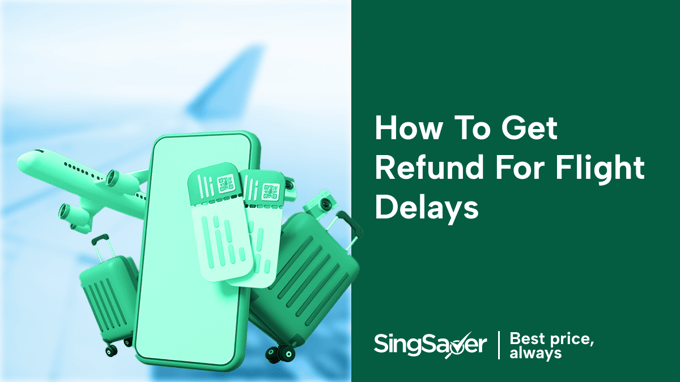Travel insurance can help you make up for financial losses stemming from a flight delay or interruption, but not all claims may be honoured. Here’s what you need to know to increase your chances of a successful claim.
Have you ever found yourself swapping tales of travel woes, where flights were delayed or, even more distressingly, cancelled altogether? These stories are more common than you might think. As a matter of fact, recent findings published on Yahoo! Finance highlights a notable increase in such disruptions, affecting travellers globally and not sparing even the most reputed airlines.
Notably, airlines like Air India and Air China were at the forefront of flight delays, with a staggering 78% of the 1,700 Singapore passengers surveyed experiencing delays with Air India. This means nearly four out of every five travellers faced unexpected wait times. Even Singapore Airlines, celebrated as the world's top airline in 2023, caused flight delays for almost 40% of the passengers who flew with them in the past year.
The situation with flight cancellations painted a similar picture. Air India, along with Cebu Pacific Air, led the pack in terms of flight cancellations.
This led to a significant number of travellers—about 40%—not receiving any form of compensation for their delayed flights, adding to the frustration and inconvenience experienced.
This is precisely where travel insurance becomes a crucial ally for travellers. In the face of such flight disruptions, having a comprehensive travel insurance policy provides a safety net, offering financial compensation and support to mitigate the impact of these unforeseen events.
One of the most useful benefits of a travel insurance plan is the ability to receive monetary compensation if your holiday plans are thwarted. Whether due to severe weather, technical difficulties or a plain mix-up, you’re suddenly grounded at the airport instead of soaring happily through the skies.
However, if you have a travel insurance plan, you can submit a claim to your insurer to help offset some of the money you may have lost (although, can anything truly soothe the pain of being so cruelly denied the promise of a long-awaited overseas vacation?).
Here’s a breakdown of how a travel insurance plan may cover you in the case of a flight interruption, as well as what you should note in order to increase your chances of a successful claim.
Table of contents
- How does a travel insurance plan protect your flight?
- Key travel insurance terms you must know
- What are acceptable reasons for travel cancellation?
- Can I claim travel insurance for missed flights?
- What incidents are excluded?
- Navigating flight cancellations and unworkable rescheduled flights
- Can you cancel your trip for any reason and THEN make a claim?
- Making a travel insurance claim for delays, curtailment or cancellation
- Can I get a refund on my travel insurance if I had to cancel my trip before my expected departure date?
- The bottom line: Know your travel policy before signing up
-png-1.png?width=800&height=250&name=SS_TI_SD_BLOGARTICLE%20(1)-png-1.png)
SingSaver's Most Recommended Travel Insurance Products: Apply today to enjoy comprehensive coverages at affordable premiums, irresistible sign-up offers, and the ultimate peace of mind during your travels.
| Product | Best for | Key coverages | Promotion |
| Allianz Travel Hero [Lowest price in Singapore guaranteed] 
|
High coverage per dollar | - Up to S$500,000 for overseas medical expenses - Up to S$150,000 accidental death and total and permanent disability - Up to S$15,000 travel cancellation - Up to S$3,000 flight delay (S$400 for daily receipts limit, min 6h) - Up to S$3,000 loss of baggage |
Buy now to receive: 4 miles per S$1 spend on your premium. Valid till 7 May 2024 8:59 am. Tavel Miles Campaign and Additional 2 Miles Travel Giveaway T&Cs apply. Complimentary lounge access during flight delays. Valid till 1 July 2024 8:59 am. T&Cs apply. Exclusive on SingSaver only. |
| FWD Travel Insurance [Best deal guaranteed] 
|
Affordability | - Up to S$1,000,000 for overseas medical expenses - Up to S$400,000 accidental death and total and permanent disability - Up to S$15,000 travel cancellation - Up to S$1,000 flight delay (S$100/6h) - Up to S$7,500 loss of baggage |
Use the promo code FWDTRAVEL to get a 35% discount on Single Trip and 30% discount on Annual Trip plans! Valid till 23 April 2024. T&Cs apply. Buy now to receive: 4 miles per S$1 spend on your premium. Valid till 7 May 2024 8:59 am. Tavel Miles Campaign and Additional 2 Miles Travel Giveaway T&Cs apply. Complimentary lounge access during flight delays. Valid till 1 July 2024 8:59 am. T&Cs apply. |
| MSIG TravelEasy [Best deal guaranteed] 
|
Comprehensive medical coverage | - Up to S$1,000,000 for overseas medical expenses - Up to S$500,000 accidental death and total and permanent disability - Up to S$15,000 travel cancellation - Up to S$1,500 flight delay (S$100/6h) - Up to S$7,500 loss of baggage |
Single Trip:Get up to 55% off when you use promo code TRAVEL55 for Single Trip plans! Valid till 28 April 2024. T&Cs apply. Annual Trip: Get up to 40% off when you buy NOW! Valid till 30 April 2024. T&Cs apply. Also receive:4 miles per S$1 spend on your premium. Valid till 7 May 2024 8:59 am. Tavel Miles Campaign and Additional 2 Miles Travel Giveaway T&Cs apply. Complimentary lounge access during flight delays. Valid till 1 July 2024 8:59 am. T&Cs apply. |
How does a travel insurance plan protect your flight?
As mentioned, a travel insurance plan provides a payout in case of a flight disruption, such as if the plane is delayed for a stipulated duration or if the flight ends up being cancelled altogether.
This compensation is useful for covering any additional expenses that may arise from the disruption. For instance, if your onward flight to your next destination, or back to Singapore, is postponed, you may need to book an extra night’s stay at a hotel, as well as incur other expenses such as meals and other amenities.
Similarly, should your airline cancel your flight, you may not get a refund; this can happen in certain situations, such as a natural disaster. Your travel policy will cover the costs of the new plane tickets you had to book as a result, up to the specified limits – and only if the underlying reason is covered by your policy (more on this later).
Other non-refundable expenses you may be able to claim include hotel bookings, attraction tickets, and other prepaid items. These would usually be listed as separate benefits in your travel policy.
Key travel insurance terms you must know
Your insurer may use slightly different terms, but generally, when it comes to how your travel policy covers your plane tickets, there are four main definitions to know and understand.
Travel delay
Most travel insurance policies offer a travel delay benefit, which is claimable if your flight fails to take off on time but has not been cancelled outright. However, not just any delay will do. To be claimable, the delay would have to be for a significant duration – typically at least six consecutive hours.
You may be covered for something like “S$200 per 6 hours of travel delays”, up to the cap indicated in your policy. Note that the minimum duration stated in your policy will have to be reached for the claim to be valid.
So, for instance, if your policy only pays out for delays six hours or longer, your claim may not be successful if your wait was shorter, say five hours.
Hence, if you are travelling in a region or season with a heightened chance of flight delays – such as during typhoon season in Japan, where there may be an increased risk of airport closures – you’ll want to pay attention to the travel delay benefit in your policy.
Also, don’t confuse travel delay with luggage delay. The latter is the benefit you can claim if your checked luggage goes missing and fails to show up when you disembark from your flight.
Trip Postponement
We get it; booking your trip well in advance is undoubtedly a smart move since you can lock in lower airfares and secure your leave dates early. But life is unpredictable, and circumstances may arise that necessitate changing your travel plans. Now, what?
Travel insurance policies typically include benefits for trip postponement that are activated under specific conditions. For instance, unexpected severe illnesses or significant events that make it impossible for you to travel as planned. Importantly, these incidents must occur after the purchase of your travel policy to be eligible for coverage.
Consider a scenario where, after securing your travel insurance, you are diagnosed with a severe illness, resulting in a hospital stay that overlaps with your planned departure. This sudden health crisis disrupts your travel plans, but you're still keen on taking your holiday once you're back on your feet. Given that the illness was unforeseen and occurred after the policy was bought, it qualifies for trip postponement benefits. However, it's important to note that not all reasons for postponing a trip are covered. Non-emergency reasons, such as minor illnesses like a common cold, typically do not qualify for trip postponement benefits.
Travel curtailment
A travel curtailment is when you are unable to continue your trip and have to return home earlier than scheduled.
In this case, you may have to book new plane tickets (if your airline doesn’t allow you to change the date of your flight), and also forego unused accommodation and other items you have already paid for. Your travel policy can cover these financial losses up to the specified limit.
Now, note that you will only be covered if you cut short your trip for reasons covered in your travel policy. These typically include serious illness or injury to you, your travelling companions or named family members only; natural disasters; unexpected strikes, civil unrest, or terrorism.
Travel cancellation
Travel cancellation benefits kick in should you be forced to cancel your trip. You can make a claim on expenses for which you were unable to obtain a refund, again, up to the limits specified in your travel insurance policy.
Note that a trip is considered cancelled only if you were unable to embark on your trip.
For instance, after booking your flight tickets to Bali, a volcanic eruption caused a closure of the airports. Authorities are unable to determine when it would be safe for flights to resume, so you decide to cancel your holiday.
In this case, you can make a claim under your policy’s trip cancellation benefits.
What are acceptable reasons for travel cancellation?
Discovering your eagerly anticipated holiday must be cancelled ranks among the most disheartening experiences for any traveller. The sting of disappointment is further exacerbated when you stand to lose the funds you've already invested in your journey.
However, with a suitable travel insurance policy, you're safeguarded against such losses, provided the cancellation is due to covered events. These typically include:
Medical emergencies
When unforeseen medical emergencies like an epidemic or pandemic declared by WHO arise, they can derail travel plans entirely. This coverage also becomes applicable if you, a travel companion, or a close relative suffers a serious health issue or injury. For example, imagine you're all set for your trip when suddenly you require emergency surgery just days before you're due to leave. Assuming this medical emergency isn't linked to any pre-existing condition, your travel insurance would typically cover the trip's cost due to this unexpected event.
Home damage
Significant damage to your or your travel companion’s home caused by events like fires or natural disasters also constitutes a valid reason for trip cancellation. If, for example, a fire severely damages your home shortly before your departure, making it unsafe or necessary for you to manage the aftermath, travel insurance might be able to cover parts of your trip.
Plane mechanical breakdown
While most travel insurance plans provide coverage for flight delays not caused by you, cancellations due to mechanical issues with the aircraft may also be covered under certain conditions specified by your policy.
Legal duties
Unanticipated legal obligations, such as being summoned to serve as a court witness during your planned travel period, are typically covered reasons for trip cancellation.
Natural disasters
For instance, if a volcanic eruption at your destination results in airport closures, making your trip impossible, travel insurance would cover the cancellation. This type of coverage is typically designed to reimburse you for expenses that are non-refundable, such as airfare, provided you haven't already received a refund from the airline or other sources.
Civil unrest
Situations of rioting or civil commotion that lead to government travel advisories against travel to your destination are covered reasons for trip cancellation. Many policies include coverage for such events under both travel delay and trip cancellation benefits, provided the unrest was unforeseen and didn't exist prior to your departure.
Bad weather
Travel insurance also steps in when bad weather leads to flight cancellations or airport closures. If you're unable to travel because of these conditions, your policy can compensate for the non-refundable parts of your trip.
Can I claim travel insurance for missed flights?
Ever found yourself sprinting through an airport, heart pounding, only to arrive at your gate and discover your connecting flight has already taken off?
Fortunately, if you miss a connecting flight due to circumstances like an initial flight delay or other disruptions that are out of your hands, travel insurance might come to your rescue and offer reimbursements. Your policy could potentially cover the expenses involved in arranging new flights and securing accommodation as you await your next connection. This is where the value of having comprehensive travel insurance becomes clear, offering a safety net in these all-too-common travel mishaps.
However, it's important to note that not all reasons for missing a flight fall under the umbrella of claimable events. For example, missing a flight due to oversleeping or arriving late at the airport without a valid emergency usually isn't covered.
What incidents are excluded?
Travel insurance policies, similar to other types of insurance, incorporate exclusions to maintain affordable premiums for policyholders. These exclusions outline scenarios where coverage is not provided. Some exclusions include:
Ignoring government travel advisories
Travel plans made contrary to government advisories often fall outside the coverage of travel insurance policies. This means that venturing into regions deemed unsafe due to issues such as civil unrest or off-limits by government warnings because instances of biological contamination and the like, can lead to insurance claims being denied.
Engagement in unlawful activities
Claims related to incidents occurring while engaging in illegal activities like trafficking of drugs or resulting in criminal conviction are generally not covered.
Participation in professional or competitive sports
Travel insurance tends to exclude coverage for injuries or accidents arising from participation in professional sports or competitive events. This exclusion applies due to the elevated risk associated with activities such as big wave surfing, cliff jumping and more, which goes beyond the scope of standard travel insurance coverage.
Travelling despite medical advice
Undertaking travel against the explicit advice of a medical professional is usually not covered by travel insurance. This exclusion is crucial for individuals with pre-existing conditions or those advised against travel due to health concerns.
Travel with pre-existing mental health conditions
Travel insurance policies may exclude coverage for incidents related to pre-existing mental health conditions. This is to ensure that individuals seek appropriate care and support for these conditions rather than facing potential risks while travelling.
Injuries sustained while overseas when under the influence
Incidents occurring while under the influence of alcohol, drugs, or other substances typically are also not covered by travel insurance.
Navigating flight cancellations and unworkable rescheduled flights
When your airline unexpectedly cancels your flight, and the alternative they offer doesn't fit your schedule, travel insurance can be a lifesaver, too.
Specifically, if the delay in reaching your destination extends beyond 24 hours from your planned arrival time for reasons acknowledged by your policy (like extreme weather conditions), you might be eligible for compensation. This could cover the cost of finding another route to your destination after accounting for any refunds you might receive. For instance, if you find a seat on a different airline that departs sooner, your policy may reimburse you for this expense.
Can you cancel your trip for any reason and THEN make a claim?
Opting for a travel insurance policy that encompasses a wide array of circumstances can significantly enhance your peace of mind by providing robust protection against the unpredictable. A key feature to consider is the "cancel for any reason" (CFAR) coverage, which acts as a comprehensive safeguard for your travel investments.
This optional coverage allows you to receive partial reimbursement for your pre-paid, non-refundable trip expenses if you decide to cancel your trip, no matter the rationale behind the decision. The CFAR benefit is an expansive extension to traditional travel insurance, covering a multitude of scenarios that are usually not included under standard cancellation policies. This means you have the liberty to alter or cancel your travel plans for nearly any conceivable reason, whether it's an unexpected obligation at work affecting your ability to go on that long-awaited solo trip, a delay in visa processing, or even a traffic delay causing you to miss your flight.
By including CFAR in your travel insurance, you ensure that almost no reason is too small for consideration, giving you unparalleled flexibility and control over your travel plans.
Making a travel insurance claim for delays, curtailment or cancellation
For the most part, making a claim against your travel policy is pretty straightforward – you’ll need to gather the supporting documents, such as receipts and official statements, submit them along with your claims, and wait for your insurer’s reply.
However, there are some finer points to the process, and being aware of them can help you increase the chances of your claims being awarded.
Approach your airline first
If your flight has been delayed or cancelled, you should first attempt to seek compensation from your airline. You may be offered a refund, vouchers for future flights, or reimbursement for meals and hotel bookings.
Be sure to get the airline to provide an official statement confirming the flight disruption, the reasons for it, and most importantly – an acknowledgement of refusal to provide refunds or compensation.
This will clearly show your insurer that you have tried – and failed – to seek damages from your airline.
However, if your airline does offer some compensation, be sure to include it in your submission. You can then ask your insurer to make a reimbursement for the shortfall not covered by your airline, a request that your insurer may be more amenable towards.
Check the exclusions in your travel policy
Not all travel plans are created equal, and different insurers may cover different things. When choosing a travel policy, it is a good idea to check the policy’s exclusions.
You can find this information in the Policy Wording, which is usually available online via your insurer’s website.
Pay attention to the circumstances or events under which your insurer does not pay out. You may be surprised to find that some travel plans do not cover flight delays due to mechanical failure (which, arguably, is the most common cause of delays!).
Also, be clear about how your insurer differentiates between adverse weather events (such as thunderstorms and high winds) and natural disasters (such as a volcanic eruption).
Both can cause flights to be cancelled or delayed, but insurers may choose to pay out only for the former, and not the latter.
Know your sub-limits
Yes, travel insurance policies don’t exactly make for light reading, and it can be a pain delving into all the details.
However, it is important to know your travel policy comes with sub-limits, which means your payout may be less than you expect.
For instance, while a certain policy may claim to offer up to, say, S$15,000 for travel cancellation, that doesn’t mean you should expect to be reimbursed the full cost of your business class flight ticket.
This is because your policy may have a sub-limit on plane tickets, which may only cover a portion of what you paid.
Document everything
From the moment you encounter a delay, cancellation, or need to curtail your trip, start documenting every relevant detail. This includes conversations with airline staff, emails, text messages, or any other communications regarding the disruption. Keep a detailed log of the events as they unfold, including times, dates, and names of individuals you interact with. This level of detail can be invaluable when you need to provide evidence supporting your claim.
Gather comprehensive documentation
As mentioned above, alongside official statements from your airline, you'll need to collect all pertinent documents related to your trip. This encompasses booking confirmations, boarding passes, documentation for any supplementary costs accrued as a result of the delay or cancellation (like meals, transportation, or lodging), and any other proof of purchase related to your travel. The more comprehensive your documentation, the stronger your claim will be.
Submit Your Claim Promptly
Many insurers have a window within which you will have to file your insurance claim after the incident occurs. Be aware of these time limits as outlined in your policy, and make sure to submit your claim within the stipulated time frame. Delaying beyond this period could result in your claim being denied.
Can I get a refund on my travel insurance if I had to cancel my trip before my expected departure date?
Securing a refund on your travel insurance policy if you cancel your trip before departure hinges on the terms and conditions outlined by your insurer. Generally, insurers offer a review period, often referred to as a "free look" period, typically ranging from 10 to 14 days after purchase, during which you can cancel the policy for a full refund, provided no claim has been made, and your trip hasn't commenced. Outside of this window, the possibility of a refund varies, with many policies being non-refundable. It's crucial to review your specific policy details or contact your insurer directly to understand their refund policy regarding cancelled trips.
The bottom line: Know your travel policy before signing up
The thing to be aware of is that there are no standard definitions or practices when it comes to travel insurance, and your coverage can differ in not-insignificant ways from one insurer to another.
This difference is not only in the sums you are covered for, but – as discussed above – the scenarios under which your claims are admissible, or not. After all, it’s useless to have a large sum assured, only to find it only covers a narrow set of circumstances.
Therefore, it is best to spend some time delving into the nitty gritty details of a travel policy you’re interested in before committing to a purchase. You can ask for a copy of the Policy Wordings, or contact the insurer directly with your questions.
This is especially important if you have specific needs or concerns, or are planning a particularly long holiday where the risk of something going wrong is increased.
Similar articles
11 Things You Probably Didn’t Know Your Travel Insurance Can Cover
Travel Insurance Coverage: How Much Are You Getting Per S$1 Premium Paid?
Travel Smart: A Guide To Claim Singlife Travel Insurance
Travel Insurance: The Safeguard You Need Against Flight Disruptions and Baggage Delays
7 Steps for Faster Travel Insurance Claims
5 Key Money Moves To Make After Budget 2023
How Much Is Travel Insurance? A Traveller’s Go-To Guide
4 Steps to Follow if You Lose Your Passport While Overseas










